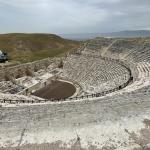
“The Sabbath was made for man, not man for the Sabbath” (Mark 2:27).
Jesus’ words mean that the Sabbath was made to protect people from being exploited. We were not made to observe the Sabbath (“not man for the Sabbath”). Instead, the Sabbath was made to be a blessing to humanity (“the Sabbath was made for man”); especially those who were being exploited.
If the Sabbath was pointing us to Christ, then, with the coming of Christ, the end of oppression is at hand! This is what Jesus means when He enters the Nazareth synagogue and asserts, “The Spirit of the Lord is on me, because he has anointed me to proclaim good news to the poor. He has sent me to proclaim freedom for the prisoners and recovery of sight for the blind, to set the oppressed free, to proclaim the year of the Lord’s favor” (Luke 4:18-19).
Now, what better day was there for Jesus to demonstrate this than on the Sabbath? The very day that was established to prevent injustices.
Therefore, contrary to popular perceptions, Jesus was not proclaiming that the Sabbath no longer applies. He was confirming that it was fulfilled. In Him, all injustices are being eradicated.
This is exemplified in Jesus’ healing on the Sabbath in Luke 13. “When Jesus saw her, He called her over and said to her, “Woman, you are freed from your sickness’” (Luke 13:12). She was freed! Just as the Israelites were slaves in Egypt and freed, so also, this woman has been set free!
This healing, then, provides an affirmation that Jesus has come to set the captives free! Indeed, the prophecies are being fulfilled. The healing of this oppressed woman is precisely what the Sabbath was for! In healing this woman, Jesus is demonstrating that the fulfillment has begun! The healing of this woman didn’t violate the Sabbath; it was exactly what the Sabbath was for!
Consequently, despite the religious leaders’ objections to Jesus’ actions on the Sabbath, His actions were in accord with the very nature and purpose of the Sabbath!
Jesus was not denying that He was working on the Sabbath. He was indeed working. His work, however, was not in violation of the Sabbath—though it was in their mind. Instead, it was fully in accord with the Sabbath.
Sabbath as Holy
Now, in order to complete a theology of the Sabbath it is important to also note that practicing the Sabbath is also a holy act. Genesis says, “Then God blessed the seventh day and made it holy, because on it he rested from all the work of creating that he had done” (Genesis 2:3). While the first six days of creation are called “good”, the seventh day is blessed by God and made holy. To be made “holy” or “sanctified” means to be “set apart.”
It is also important to place the Sabbath discussion in the discussion of God’s economy! Throughout Scripture, we see that in God’s economy, He provides for His people as an act of grace. That is, God’s people will succeed because they are blessed by God. They do not get ahead because of their hard work, or their ingenuity. They certainly will not get ahead because they abuse their workers!
Another way to understand how the economy of God is directly related to the issue of the Sabbath is to note that the land was also supposed to enjoy the Sabbath.
“You shall sow your land for six years and gather in its yield, but on the seventh year you shall let it rest and lie fallow, so that the needy of your people may eat; and whatever they leave the beast of the field may eat. You are to do the same with your vineyard and your olive grove. Six days you are to do your work, but on the seventh day, you shall cease from labor so that your ox and your donkey may rest, and the son of your female slave, as well as your stranger, may refresh themselves” (Exodus 23:10-12).
It is very important to note that the provision of letting the land rest is also in accord with providing for the poor and the needy: “so that the needy of your people may eat” (Exodus 23:12).
Now, if one thinks about it, this doesn’t appear to be the best way to reap an economic boom. After all, only sowing in six out of seven parts of the field will not reap as large a harvest as sowing on all seven parts. Sure there are studies that have concluded that the land is actually more productive when it is allowed a year of rest.
But we must wonder if the ancient Israelites knew this. There were simply instructed to give the land a rest every seven years. How were they to find provisions during the seventh year? God will provide!
This is how the economy of God operates. God provides and His people are blessed. They are blessed not because they followed the economic ideals of the world. Instead, they are blessed because they have been obedient to God.
Our goal is to keep these posts free of charge. I do not intend to ever hide them behind a paywall. I can only do this if those of you who have been blessed by them and can afford to give ($5, $10, $25, or more/month) do so. You can give a tax-deductible contribution by following this link.
Please share this post and let others know about determinetruth.
If you wish to view this blog on your smartphone through the Determinetruth app simply download the “tithe.ly church” app on your smartphone and insert “determinetruth” as the church name you wish to follow. Once it is loaded, simply click on the “blog” icon and it will automatically load.
If you would like to have Rob speak at your church or organization in person or via Zoom, please let us know by filling out the contact info on the Contact me tab on this site.

















